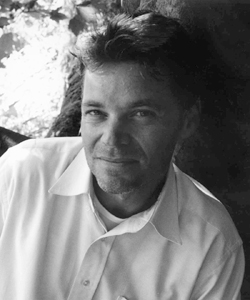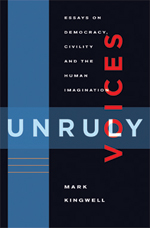Unruly Voices: Essays On Democracy, Civility and the Human Imagination
Mark Kingwell on fugitive democracy, the cultural role of philosophers, and hockey-borne Canadian anti-intellectualism
As a contributing editor of Harper’s Magazine and professor of philosophy at the University of Toronto, Mark Kingwell often writes about salient cultural and political issues with an eye toward theory. In his newly published book, Unruly Voices: Essays On Democracy, Civility and the Human Imagination (Biblioasis), he addresses topics from architecture and society to fiction and citizenship, inviting his readers to reconsider the social and political landscape. I put six questions to Mark about politics, culture, and philosophy.
1. Why do most citizens value thinking as a means rather than an end?
Most citizens value everything as means rather than an end. This is partly baseline human behavior and partly a hyped-up version of instrumentality, which currently functions as the operating system of everything from technology itself through to creativity, education, and public discourse, and even to friendship and family life. The triumph of economic thinking is that it has become the invisible presumption of everything; there is nothing, or almost nothing, that cannot be reduced to a transaction. So it can hardly be a surprise that thinking itself, which ideally ought to resist and oppose instrumentality, or at least put it in its proper place, has fallen prey to the same reduction.
The most obvious place to push back on this, I think, is in the university, which still has a grasp, albeit a feeble one, on the value of liberal education. I say it’s feeble because the bulk of recent evidence shows that even elite universities have become little more than brand factories and legacy schemes, like frequent-flyer rewards plans for the wealthy. Because I’m a university professor by day, I like to believe that we can work against that trend by being better teachers, communicators, and thinkers.
From Unruly Voices:
The idea of the individual, the main pillar of democratic thought for nearly four centuries, is undergoing shifts both subtle and profound. Only by returning to the question of selfhood—how is it that we are what we are?—can any light be shed on the deepest regions of the demand for democracy. The narrative assumptions of selfhood, the structure of reflection on past actions and future possibilities, is so much taken for granted in our lived experience that we most often fail to remark both the political implications of that narrative and, more deeply, the fragility of its construction. The very idea of consequence—I mean the notional shift from a childish sequence of and then, and then to an adult sequence of and thus, and thus—is a contingent and uncanny work of political art. More so now than ever before it must be interrogated, not assumed, precisely because it is evidently (we might say literally) coming apart in our hands. That is, the more we try to mirror the self in devices and desires, replacing ethical reflection with multiple reflected images of our ‘likes’ and ‘friends’, the more we consume the modern conception of the individual, in effect eating its brains (22–23).
2. How can philosophers compel the public to reflect on culture?
Compel is such an awesome punchy word! Alas, I don’t think you can ever compel reflection—would that we philosophers had that kind of power. No, the actual process of reflection, whether on one’s culture or on one’s deeper place in the world, has to be motivated from within. But we don’t have to sit still and do nothing. From Socrates onward, it has been obvious that one way to prompt thought is by being irritating and indigestible. The Greek-root word xenocyst captures what I mean: it refers to the lump of foreign matter that enters a complacent system and induces a kind of internal instability. We might think of the abrasive grain of sand that slips inside an oyster’s shell. In attempting to stabilize itself, the oyster creates something new and beautiful out of what as before only annoying.
A linked idea goes to the Latin roots of the word educate, which means to lead out or bring up. Without subscribing to the Socratic notion that we already contain all ideas within us and just need the artful extraction of intellectual midwifery, we can say that wisdom must come from within an individual: it can’t be poured into someone, as if into an empty vessel. So actually the more useful notion here is not education but seduction. Interlocutors need to be drawn in close enough so that the perverse thought or unsettling idea can take hold. Sometimes charm and humor are more effective than argument, in other words.
Staying with Socrates, it must be noted that this can be a dangerous business. What happens to the grain of sand? What becomes of the seducer? We all know the part about drinking the hemlock. Of course, one of our current problems is that we don’t take philosophers seriously enough even to consider putting them on trial for corrupting our youth, though I for one keep trying.
3. You say in “What Are Intellectuals For?” that “whoever tells you Canada is less anti-intellectual than, say, the United States or Britain hasn’t been paying attention.” Why do you think liberal Americans still tend to look to Canada as an exemplar of tolerance, in that case? And is there a difference in the quality of Canadian anti-intellectualism, if not the quantity?
Canada’s history of social programs and reputation for politeness are unconnected, it seems to me, but people looking at us from outside often see some sort of link, then make a further leap to the political theories of cultural diversity and tolerance. It is worth separating the strands. Our socialized medicine and welfare provisions are born of an awareness of fragility: this was a hard land to settle—indeed we have really settled only the tiniest southern strip of it—and that leads to an awareness of shared risk. The culture of tolerance is related in the sense that it is rooted in the immigration waves and multi-racial origins that mark Canada’s history. This is mostly a nation of recent arrivals—even as our treatment of the First Nations remains confused and sometimes shameful.
So the toleration culture is there as another kind of survival mechanism: negotiating differences rather than eliminating them. Hence, in a good way, our annoying and apparently eternal discussion of Canadian identity. This is one of the world’s truly postmodern nations; there is no Canadian identity save the ongoing question of what that identity is. But there is still plenty of acrimony, bigotry, hatred of the other, and racism. Not so nice after all, really, and New Yorkers would probably be surprised to know that they are a lot friendlier than us allegedly polite Torontonians. Nobody looks at anybody here, and the driving is terrible.
As for the special quality of Canadian anti-intellectualism, I would call it smug, hockey-loving, and aggressively masculine. It comes from deep within the Protestant, mercantile soul of the nation. Yep, we have rednecks here too; they just don’t have as many radio shows.
4. Citizens United v. The Federal Election Commission has all but sealed the political position of what you call “entrenched elites,” having given even more power to the wealthy. With the Occupy movement fizzling, how can non-plutocrats influence politics?
I’ve been reading a lot of apocalyptic commentary on the current state of American wealth distribution, which is more unequal than pre-fall ancient Rome: Chrystia Freeland, Christopher Hayes, Chris Hedges, Mike Lofgren, and so on. It fascinates and frightens me. If there is no possibility for reform, is a drastic collapse really coming?
There is no doubt in my mind that Citizens United changed things decisively, and really sealed the trends toward greater wealth concentration and total capture of the political system. I saw Mark Halperin give a talk a while back, and he was asked if the Court’s decisions rendered the politics of personality irrelevant. He denied it, saying people still focus on the two guys facing off for the top job. That’s true, but it misses the point. The politics of personality are now fully revealed as a mummer’s play, an avoidance ritual. They command attention even as the massive structural shift to what we ought to call capito-democracy continues to roll into place.
I think the best response to these trends lies in a kind of fugitive democracy, a democracy without politics: maybe something like Deleuze and Guattari’s line of flight or the Situationists’ dérive. But this is the answer of a socialist who finds anarchism more and more attractive.
5. Why must we save the City? And how can we do so?
The French urban theorist Henri Lefebvre liked to refer to “the right to the city”—the idea that each and every occupant has an a priori claim on all the possibilities the city has to offer. This includes so-called positive externalities such as entertainment, public spectacles, and sexual opportunity. It likewise includes access to public space, that much-abused concept. Most of what is called public space in cities is in fact private or municipal space. We all know what happens to private space when its owners decide to exert control, and with politics more and more subject to commercial influence, municipal space cannot be counted upon to remain free and accessible.
So here my thoughts mesh with those of the last answer, since taking and enjoying public space, maybe in stealthy or playfully transgressive ways, is one way to exert the right to the city and practice a little fugitive democracy at the same time.
6. “All in the Game,” an address to Barack Obama as he began his first term, discusses the necessity of rhetoric in politics. As we endure the rhetorical excesses of election season, what positive role do you see for rhetoric in the democratic process?
Rhetoric used to be one of the liberal arts—part of the medieval trivium, or three roads to wisdom. The other two were grammar and logic, and they went along with the scientific quadrivium of arithmetic, astronomy, geometry, and music. The ancient philosophers argued that rhetoric in the service of truth was not only a great art but an essential condition of thriving civic life. Rhetoric is the art of persuasion, not of manipulation or cynical denigration of an opponent.
But already in Plato’s Republic we see the implicit problem. In the figure of the Sophist Thrasymachus, Plato satirizes the growing influence of rhetoric-for-hire, the kind of thing in today’s attack ads—and indeed in debates and stump speeches—that has reached a high pitch of uncivil personal charges and misinformation. This is the steed of rhetoric unhitched from its tether to the truth, and there will be no path to wisdom found while riding that rough beast!
That was me being rhetorical. I experimented with tone and form in this collection—there is second-person monologue, first-person dialogue, the usual third-person argument, and so on—in part to try different ways of making arguments, of doing philosophy, of thinking. Rhetorical excess, like incivility, is a symptom of a deep malaise in the body politic. It’s going to take a lot of imagination to get our diagnosis right, and even more to start work on a cure.
I’ll be honest: I go back and forth on the odds for success in this most important of democratic projects. But we’ve got to try. For one thing, there is no other option. I mean, what else are we going to do? After all, to quote The Skinhead Hamlet, an awesome parody of Shakespeare’s original that I discuss briefly in one of the book’s essays on civility: “The rest is fucking silence.”





